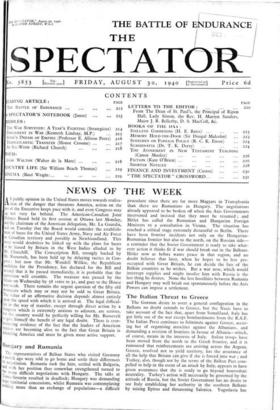iltingary and Rumania
The representatives of Balkan States who visited Germany month ago were told to go home and settle their differences °Y negotiation. Rumania took the hint, settled with Bulgaria, and with her position thus somewhat strengthened turned to the more difficult negotiations with Hungary. The talks at Turnu-Severin resulted in deadlock; Hungary was demanding large territorial concessions, whilst Rumania was contemplating licithnig more than an exchange of populations—a difficult procedure since there are far more Magyars in Transylvania than there are Rumanians in Hungary. The negotiations already appeared to be broken off when the Axis Governments intervened and insisted that they must be resumed ; and Hitler has called the Rumanian and Hungarian Foreign Ministers to a consultation in Vienna. The situation has reached a critical stage extremely distasteful to Berlin. There have been frontier incidents not only on the Hungarian- Rumanian frontier but also to the north, on the Russian side— a reminder that the Soviet Government is ready to take what- ever action it thinks fit if war should break out in the Balkans. Hitler now as before wants peace in that region, and no doubt believes that later, when he hopes to be less pre- occupied with Great Britain, he can decide the fate of the Balkan countries as he wishes. But a war now, which would interrupt supplies and might involve him with Russia is the last thing he desires. None the less hostilities between Rumania and Hungary may well break out spontaneously before the Axis Powers can impose a settlement.


























